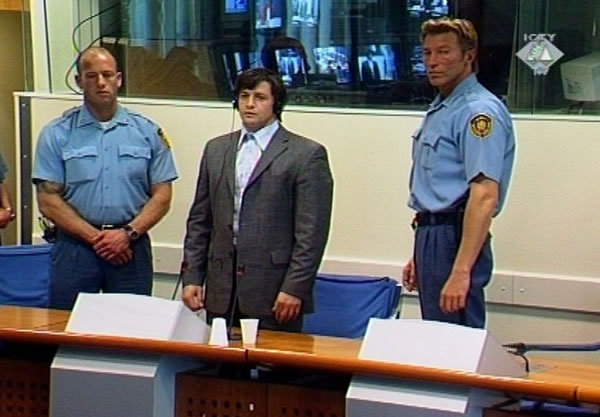Home
NASER ORIC TRIAL BEGINS TOMORROW
Apart from survivors and eye-witnesses to the crimes which Oric, former BH Army commander in the Srebrenica area, is charged, the prosecution will call people who fought side by side with Oric as well as representatives from the international community who negotiated with him in 1993. The defense calls "this is a unique case in history that a representative of a people under siege… is tried for alleged crimes against the enemy besieging them."
 Naser Oric in the courtroom
Naser Oric in the courtroom The trial of Naser Oric, former BH Army commander in the Srebrenica area, will begin tomorrow with opening statements by the prosecution and the defense. He is charged with crimes committed by forces under his control between May 1992 and March 1993.
The case will be heard by the Trial Chamber presided over by Maltese judge Carmel Agius; the other two judges in the Chamber are temporary--or ad litem--judges appointed to hear this case only: Braydensholt from Denmark and Albin Eser from Germany.
The prosecution team will be led by Dutch prosecutor Jan Wubber, assisted by two other prosecutors: Gramsci Di Fazio and Patricia Sellers from Australia and the USA respectively. Naser Oric will be represented by Sarajevo lawyer Vasvija Vidovic and Briton John Jones.
The indictment against Naser Oric was issued in March 2003; the accused was arrested in April 2003 in Tuzla by SFOR. The OTP charges him with the murders and cruel treatment of Serb civilians detained in the Srebrenica police station, the wanton destruction of cities, towns and villages, and the plunder of public or private property. The indictment alleges that between May 1992 and February 1993, forces under his command burned, destroyed and plundered at least 50 Serb villages and hamlets in the municipalities of Bratunac, Srebrenica and Skelani; thousands of Serbs fled the area as a result.
At his initial appearance before the Tribunal on 15 April last year, Oric pleaded not guilty to all the charges, qualified as violations of the laws and customs of war.
The prosecution will call 62 witnesses to try and prove the allegations in the indictment; their examination-in-chief will last an estimated 11 weeks. The defense has asked to be given the same or a similar amount of time for its cross-examination. The Trial Chamber will render its decision on that motion at the beginning of the trial.
The prosecution’s pre-trial brief does not disclose the names of the witnesses. But from extracts of testimony quoted there, it can be concluded that apart from survivors and eye-witnesses to the crimes Oric is charged with, the court will hear testimony from some of the soldiers who were subordinate to him, as well as from representatives of the international community involved in the Srebrenica area in 1992 and 1993. Judging by the prosecution’s pre-trial brief, it is possible that among the witnesses will be French general Philippe Morillon or some of his close associates who met with the accused and had talks with him in March 1993.
The prosecution tendered into evidence numerous military documents and reports and orders signed by the accused; Oric's defense is challenging their authenticity. That is why the first prosecution witnesses will be experts who will try to prove the authenticity of the tendered documents.
Oric's defense indicated in its pre-trial brief that it would be arguing that the accused had not had effective control over the forces that committed the crimes. It describes the attacks on the Serb villages as "defensive actions" and desperate attempts to get some food for the besieged civilians in the Srebrenica enclave.
His defense claims that Naser Oric’s case is "the only case in history in which a representative of a people under siege, a people threatened with genocide, stands accused before an international tribunal of alleged crimes committed against the enemy besieging them."
This trial is not expected to last longer than a year.
